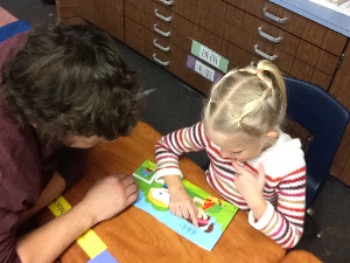The Office for Global Engagement no longer runs the Dual Language Immersion Fair, please contact the Department of Languages and Cultures for information about future DLI fairs.
There’s a phenomenon called cognitive mapping that as you get older your brain becomes more and more efficient at your first language and it is screening out all other sounds.

Decades of research have proven that young children who learn a second language in an immersion environment acquire and retain the new language more effectively than adult learners. Recent neurobiological research is beginning to tell us how and why. Research is also showing that in addition to the benefit of learning a new language, the cognitive development of immersion students is enhanced in multiple ways as they are learning more than just the language.
This is a choice for parents who really want to have this kind of language learning for their kids when they realize that they are going to be bilingual and biliterate coming out of elementary school.
It is probably the most effective way of learning a foreign language in the context of a school setting.
There is nothing to be lost academically or linguistically by involving children in learning a second language… We truly have parents knocking down our doors to make this accessible to our students.